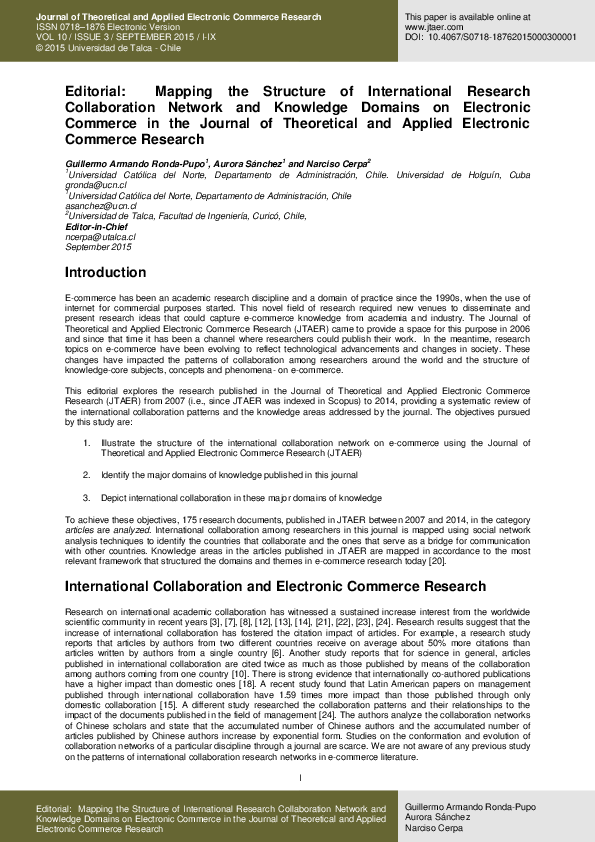Examining the Retail Delivery Choice Behavior in a Technology-Aware Market
IF 5.1
3区 管理学
Q1 BUSINESS
Journal of Theoretical and Applied Electronic Commerce Research
Pub Date : 2024-06-04
DOI:10.3390/jtaer19020070
引用次数: 0
Abstract
This study aims to provide valuable insights into consumer preferences for delivery services in online shopping in Chile. The COVID-19 pandemic has accelerated the evolution of delivery and logistics services, leading to increased competition among online stores. Chile, with its highly digitally enabled population and a competitive landscape of online retailers, serves as an ideal reference case for Latin America. By analyzing key delivery attributes such as delivery time, order arrival time range, compensation policies for delivery delays, and delivery prices, we offer valuable insights into consumer behavior. These insights will, in turn, inform the formulation of effective strategies within the online shopping industry. We examine the following aspects: (a) The willingness of consumers to pay for the service attributes; (b) The relative importance assigned to these attributes by consumers; and (c) The relationship between consumer preferences and socioeconomic characteristics. Using Multinomial Logit Models and a database from a Discrete Choice Experiment, we have discovered that the most significant attributes of delivery service are the time until product arrival and the existence of compensation in case of delivery delays. Additionally, we found that consumers are willing to pay more for the same delivery service if the product is large, as large products generally have higher prices. Furthermore, we observed that delivery time preferences vary by gender and for small products, and price sensitivity varies according to educational level, household size, and socioeconomic status. To the best of our knowledge, no previous research of this kind has been conducted for Chile.研究技术意识市场中的零售配送选择行为
本研究旨在就智利网购中消费者对送货服务的偏好提供有价值的见解。COVID-19 的流行加速了送货和物流服务的发展,导致网店之间的竞争加剧。智利拥有高度数字化的人口和竞争激烈的在线零售商,是拉丁美洲理想的参考案例。通过分析送货时间、订单到达时间范围、送货延迟补偿政策和送货价格等关键送货属性,我们提供了对消费者行为的宝贵见解。这些洞察力反过来将为制定网上购物行业的有效战略提供参考。我们研究了以下几个方面:(a)消费者为服务属性付费的意愿;(b)消费者赋予这些属性的相对重要性;以及(c)消费者偏好与社会经济特征之间的关系。通过使用多叉 Logit 模型和离散选择实验数据库,我们发现送货服务最重要的属性是产品到达时间和送货延迟时的赔偿。此外,我们还发现,如果产品体积较大,消费者愿意为相同的送货服务支付更多费用,因为体积大的产品一般价格较高。此外,我们还观察到,不同性别的消费者对送货时间的偏好不同,对小型产品的偏好也不同,而对价格的敏感度则因教育水平、家庭规模和社会经济地位而异。据我们所知,智利以前从未开展过此类研究。
本文章由计算机程序翻译,如有差异,请以英文原文为准。
求助全文
约1分钟内获得全文
求助全文
来源期刊
CiteScore
9.50
自引率
3.60%
发文量
67
期刊介绍:
The Journal of Theoretical and Applied Electronic Commerce Research (JTAER) has been created to allow researchers, academicians and other professionals an agile and flexible channel of communication in which to share and debate new ideas and emerging technologies concerned with this rapidly evolving field. Business practices, social, cultural and legal concerns, personal privacy and security, communications technologies, mobile connectivity are among the important elements of electronic commerce and are becoming ever more relevant in everyday life. JTAER will assist in extending and improving the use of electronic commerce for the benefit of our society.

 求助内容:
求助内容: 应助结果提醒方式:
应助结果提醒方式:


